- Home
- Vicki Delany
Unreasonable Doubt Page 11
Unreasonable Doubt Read online
Page 11
And that meant the case was now active and on his desk.
Twenty-five years had passed. Witnesses had died or moved away. The investigating detective was dead, his closest colleague uncooperative. Chances were good that the perp had left town a long time ago—probably thanking his lucky stars that some other poor guy had been stuck with the guilt.
Winters would start his investigation by searching for similar crimes. Begin with the year in question and then branch out, moving forward and backward through time. The sort of thing that had been done to Sophia, a frenzy of savagery, was never a one-off. If Winters was lucky, he could find some guy doing hard time for a similar killing.
Go back to the D’Angelos, ask questions, dredge it up again. All the memories, all the pain. The same with her friends and her coworkers.
He wouldn’t be a popular man around town, that was for sure.
He logged onto his computer to begin filling out a ViClas report. Start the wheels turning in an attempt to locate similar situations.
Having to reopen the case wasn’t entirely bad: he needed something to do to keep his mind off what had happened to Eliza. His gut churned simply thinking about it. The art gallery had opened this morning. Margo had stopped by the house last night and, trying to smother her cough, said she was well enough to come back to work. Eliza was feeling better, but her face wasn’t looking good. Winters knew from personal experience the third day was the worst. That’s when the swelling started to go down but the colors came out in all their glory.
He remembered the first time he’d taken a punch to the face. He’d been a new cop, young, naïve, keen, still wet behind the ears. They’d been called to a bar where a big-time brawl had broken out. When he tried to separate two of the combatants, a third guy had come out of nowhere and delivered a solid punch to Winters’ jaw. He’d been frozen in place for a moment, stunned and not quite understanding why someone would want to hit him. Fortunately, his partner had been a grizzled old guy who’d learned long ago that the uniform didn’t give him immunity.
Winters had gone to his parents’ house for Easter dinner two days later. His poor mom had almost fainted at the sight of his face. She hadn’t been happy at him going into police work in the first place, and over the ham, scalloped potatoes, and green beans her conversation was all about the successful careers her friends’ children were enjoying.
He’d learned over the years to avoid a punch when he could, and to roll with it when he couldn’t. His blood boiled simply thinking of someone hitting Eliza.
Chief Paul Keller had walked into his office yesterday morning and told him Ray Lopez would be investigating the attack on Eliza, what was almost certainly an attempted rape. Winters was to stay out of it, to work on anything else that came up, and on the D’Angelo killing when he had the time.
No arguments. Keller had turned and walked out.
Winters went back to his computer. It didn’t take long before he found a similar case to the D’Angelo murder. It happened in Revelstoke, about three and half hours’ drive from Trafalgar. In mid-November of 1990, two months before the death of Sophia, a twenty-five-year-old white woman with long dark hair left her job at a lawyer’s office to walk the few blocks home. Her body had been found in a park not far from her house the following morning. Like Sophia D’Angelo, she had been penetrated with a sharp instrument and her throat had been cut. No one was ever arrested for that crime, and the case remained open to this day.
Winters searched for any mention of the Revelstoke killing in the files of Sophia’s case, but found nothing. He leaned back in his chair. That was odd. Even twenty-five years ago, when they didn’t have the computer systems they had now and police forces weren’t as good at cooperating and exchanging information, someone should have noticed the similarities.
“How’s Eliza?” Barb said from the doorway.
Winters blinked and rubbed his eyes. Barb’s purse was tossed over her shoulder. “What time is it?” he asked.
“After two. I’m going out for a late lunch because the chief had some last-minute work to do on his speech for Rotary this afternoon. Do you want me to pick anything up for you?”
“A sandwich would be nice, thanks. Whatever looks good.” The day had passed without him even noticing. He leaned back and stretched. With a twinge of guilt, he realized that he’d been so engrossed, he hadn’t given Eliza another thought. Eliza. Now that he was thinking about what had happened to her, at the same time as reading the D’Angelo file, he was getting angry all over again. There had been no sign of a knife threatening Eliza. He had to remember that. He couldn’t afford to get the cases mixed up, even in his head.
“Barb, I’ve been going through the D’Angelo case files. I know the situation’s upsetting to you, but if you wouldn’t mind, I’ve got questions for someone who was there.”
She gave him a tight smile. “Why don’t I get those sandwiches and then we can talk? I’m happy to help, if I can.”
“Good idea. And in answer to your original question, Eliza’s okay. Nothing’s permanently damaged, but her face looks worse than it is. She won’t be leaving the house for a few days. Here.” He dug in his wallet and handed her a green bill. “My treat.”
“Be right back.”
She brought him a baguette heavy with roast beef and a generous slather of mustard, and a ham and Swiss for herself. They unwrapped their sandwiches in silence. “You must know,” Barb said at last, “people are saying Walter Desmond attacked Eliza.”
“About the only thing Eliza and Merrill agree upon is that he was a young man with long dark hair. Never mind the hair, Desmond is not young, and certainly doesn’t look it. Prison takes its toll.”
“Ray went around to the B&B,” Barb said. “To warn Walt about the gossip.”
“How’d he react?”
“He said people have been saying worse things about him for a long time. I’d just wish he’d leave, John. He has to know he’s not welcome here. Innocent or not.”
“Tell me about Doug Kibbens. And be honest, please, Barb. Loyalty is a good thing, but our first loyalty has to be to the truth. Wouldn’t you agree?”
She nodded slowly, chewed thoughtfully. “I started working here straight out of high school. Right from day one, I loved every minute. I loved being part of it. The excitement, the belief that we were doing good. My friends thought it was so thrilling, and although I never divulged any confidential information, I might have been guilty occasionally of letting them think I was more important than I was.
“Most of all, I loved the guys. They were all guys, men, back then. In the bigger cities women were starting to get ahead as officers, but not out here. I heard the occasional crack about women not being able to take it, and I agreed with them. Being a police officer was all about being tough, about bringing down the bad guys.” She smiled. “Now, I look at Molly and Dawn and see what great officers they are. Gentle and empathetic one minute and as tough as any of the old guys the next. The difference is, I think, that they know when to be kind and when to be hard. It’s not all about bashing heads all the time. Rhetorically speaking, of course.”
“I understand.”
“Doug Kibbens was an old-time cop. This town was different back then, John. It was still a working-man’s town, not the tourist place it is now. Not as affluent. The occasional hippie or band of New Age travelers wandered into town, and Kibbens and his men would take them aside and tell them they wouldn’t like it here. So they left.” She chuckled. “A lot of them went up the valley, and there they remain to this day. By the time of the D’Angelo murder, things were changing. And changing fast. More tourists, a greater variety of people moving here. A lot more money. The new chief came from Toronto and brought a much more cosmopolitan outlook on the world.”
“How did Kibbens handle the changing times?”
“I thought he did okay, John. He did his job, got
promoted to sergeant. He was a good cop. And I’m saying that because I believe it. I do.”
“I checked his file. He died the year after the D’Angelo case. Car accident.”
Barb’s eyes slid to one side.
“What?” Winters said.
She let out a heavy sigh and put down her sandwich. “The accident report was doctored somewhat.”
“What do you mean?”
“The line about going off the road in icy conditions? Not true. The road was dry and there’d been no rain or snow that day. It was a single-car accident. He went off the side of the mountain at the top of the pass.”
“Suicide?” Winters knew that a substantial number of single-car accidents, heck even some multi-vehicle ones, were believed to be suicides. Hard to prove.
“Probably,” Barb said. “No skid marks. No hazardous road conditions. Just a straight line through the guardrail and over the edge. One of the guys altered the Mounties’ report to mention ice on the road, and the chief let it stand. Out of respect, really. It might not have been suicide. He might have swerved to avoid a moose or elk. The car burned, so there wasn’t much evidence left, of the car or of Doug himself. Maybe he had a heart attack.”
“Kibbens was alone in the car?”
“Yes, thank heavens. He was divorced by then, and his wife had moved away. I forget her name. They didn’t have any children.”
“He was still working here when he died,” Winters said. “Someone would have cleared out his desk. I don’t suppose you remember what happened to his stuff?”
“As it happens, I do. I was the one who had to pack up the residue of his entire career. It wasn’t a nice job. His ex-wife came back for the funeral, but she didn’t want anything of his. It was boxed and labeled and sent to the city hall basement where I guess it remains to this day.”
***
“What would you do, Adam?” Smith asked. “If you knew a cop had done something wrong, but no one else did?”
“Why are you asking, babe?”
“Hypothetical case.”
“Geeze, Molly, don’t try out for the movies, will you? You can’t act your way out of a paper bag. Spill.”
“I can’t, Adam. If I tell you, then you’ll be compromised. One of my colleagues did something. I should tell, but I don’t want to rat him out. Or her. Him or her.”
“No clues in that phrasing, Mol. Did he do something illegal or unethical?”
“Not illegal. I’d say unethical. Some might not agree.”
“Harassment of another cop? Did someone say something to you? I’d break his freakin’ neck, except you told me not to do that.”
“It didn’t involve me. I happened to see him, or her, in the act of disobeying a direct order.”
“That’s a hard one, but if it was me, I’d let it go. But it’s not me, so you have to do what you think right. My advice, for what it’s worth, is if he put anyone’s life in danger, or interfered with evidence or something, you can’t let that pass, but otherwise let Dave trip himself up.”
“I didn’t say any names.”
“You don’t have to, Molly. Even over at our office there’s talk about Dave Evans. He cuts corners, takes shortcuts, throws his weight around. He’ll hang himself, soon enough.”
She let out a laugh that contained not a trace of humor. “Nice to know it’s not just me who thinks he’s a jerk.”
Adam put his arms around her and held her close. He ran his hands up her back and his breath was hot on her neck. He whispered in her ear, “You’ll do the right thing, because you’re you. If you need me, you know I’m here. I’ll always be here.”
Norman barked his agreement.
Chapter Twenty
Walt Desmond flinched at the sound of the front door opening. He thought he’d be able to relax here at the B&B, a quiet house among friendly people. He’d been a fool. The cops weren’t going to let him carry on as if nothing had happened—as if he were only another tourist, here for the mountain air and the great views.
A different officer, a detective, had come by yesterday, first thing in the morning. Asking him about some woman who’d been attacked in town the previous night. Oh, yeah, he made it sound as if he had Walt’s interests at heart. “Thought you should be aware, sir, some people are saying it’s not a coincidence this happened so soon after your return.”
Some people. Meaning if folks weren’t already thinking it, the cops would make sure they added two and two and came up with five. The guy had been friendly enough. Frankly, Walt would prefer dealing with the uniformed goons who’d threated him last night. Always better knowing exactly what you’re up against, right off the bat. Another lesson he’d learned in prison.
Some of the tension drained out of his shoulders when he heard soft footsteps in the hall. Not the cops this time, but one of the women.
“It’s a lovely day. You should be outside.” Carolanne came into the common room.
“Just using the computer,” Walt said. “Where’s the rest of your gang?”
She threw herself into a chair. Her face was flushed with health and exercise, and her legs were brown from the sun. Her tight shorts showed muscles taut and sleek. “They have gone, hard as it is to believe, kayaking.”
“Why’s that hard to believe?”
Carolanne groaned. “We were on the water at eight o’clock. Every muscle I own aches. Muscles I didn’t know I owned ache.” She laughed, lifted her arms, took off her ball cap and ran her fingers through her hair. Her breasts were small and round. For some reason he thought of windfall apples. “All I wanted in the whole world was to finish the last run and get into the shower, and then Darlene proclaimed, ’I’ve got a great idea.’ She’s a maniac, that one. So off they’ve all gone to rent kayaks. Tomorrow’s the open house down by the lake. We’ll be having some fun,” she made quotes in the air with her fingers, “races and taking interested people out for a paddle. You should come, Walt.”
“I don’t think I’d fit in,” he said.
“Everyone fits in. That’s the great thing about dragon boating. There are men’s teams, women’s teams, mixed teams, teams of young people, seniors’ teams. All ages can do it. I have to admit that as exhausting as I’m finding my teammates, I’m glad I’ve gotten into this.”
I’m glad you have, too, he thought but would never say.
She jumped to her feet. “I’m hitting the shower. Then I’m going to walk into town. Browse the shops, have a coffee.”
“Have fun,” he said.
She stopped in the doorway, hesitated, and turned back to face him. “Come with me, Walt?”
Panic crashed into his chest. “I couldn’t.”
“Sure you could. You need to get outside. If I might say, you could use some sun. Finish up what you’re doing, and we’ll go. I won’t be long.” She dashed off.
He stared at the space where she’d been. The air was full of the scent of her. Sweat, not the rancid scent of sweat generated by bitter, angry, violent men doing hard time, but something light, almost fresh. The sweat of a hard workout on the water under a hot sun. Good sweat on a clean body. The sweat of laughter and fun. Not of desperation and rage and hate.
He’d stayed in all day, afraid of running into more cops or some of his old neighbors, who might be also thinking it was not a coincidence a woman was attacked only hours after Walt returned to Trafalgar. They wouldn’t bother him, surely, if he was with Carolanne. Yes, a walk would be nice.
He turned back to the computer to check the e-mail account Louise had set up for him. He logged onto G-mail the way her assistant had taught him. He had one message. He read it quickly, and leaned back in his chair with a low whistle.
Five million bucks. This morning Louise filed the papers to sue the government of British Columbia for five million dollars on his behalf.
Chapter Twenty-one
/> Eliza was one of those people who didn’t eat when they were upset, so Winters had gone home after his sandwich with Barb to make his wife toast and a soft-boiled egg. She was a stoic, largely unemotional person, and even after having been married to her for thirty years, Winters couldn’t always read her. She seemed to be doing okay. Concerned about her appearance, for sure. Her lip was cut, her left eye swollen, and the tender skin around it turning purple, black, and yellow. But no bones had been broken, swelling would go down, cuts would heal, and skin would repair. Her stomach held a bruise the size of a fist and she grimaced when she laughed, but again, no permanent damage had been done. Human bodies are resilient.
Eliza was resilient.
She greeted him with a kiss, then caught a glimpse of herself in the hall mirror. “I hope no one is saying the police made me invent an attack by a stranger to cover for you knocking me around.”
“Don’t even joke about it, Eliza.”
She ran her fingers over his cheek. “Don’t mind me. I know how upsetting this must be for you.”
He couldn’t help but give her a smile. “Look at you, trying to comfort me.”
“I’m hoping to go into the store on Monday. I feel fine, a bit sore, but no worse than if I’d put in too much time at the gym after a long break. I’d go in tomorrow, but I think it’s better to let the town’s conversation die down a bit first. In the meantime, I can do paperwork here as easily as there. It’ll give me a chance to get the September exhibit organized.”
He didn’t think she was feeling as blasé about the incident as she was pretending. But he gave her a kiss and didn’t pry.
“I don’t suppose you have any news?” she said.
“Ray’s on it,” had been all he could say.
***
Meredith Morgenstern ordered a glass of white wine. The man with her asked for a beer, and the waitress went to get the drinks.
“Thanks for seeing me,” the man said. Meredith knew he was forty-two, but he looked a good deal older. He was several inches shorter than her five-foot ten, and considerably overweight. He still had a full head of thick black hair, but he peered at her through coke-bottle-bottom glasses.

 Silent Night, Deadly Night
Silent Night, Deadly Night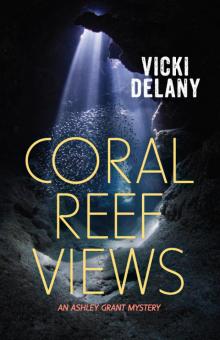 Coral Reef Views
Coral Reef Views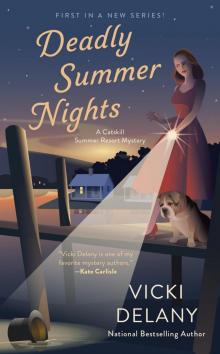 Deadly Summer Nights
Deadly Summer Nights Murder in a Teacup
Murder in a Teacup Whiteout
Whiteout Dying in a Winter Wonderland
Dying in a Winter Wonderland Tea & Treachery
Tea & Treachery Rest Ye Murdered Gentlemen
Rest Ye Murdered Gentlemen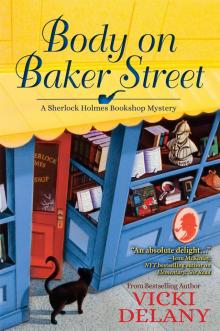 Body on Baker Street: A Sherlock Holmes Bookshop Mystery
Body on Baker Street: A Sherlock Holmes Bookshop Mystery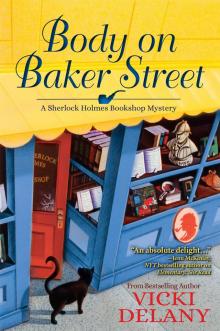 Body on Baker Street
Body on Baker Street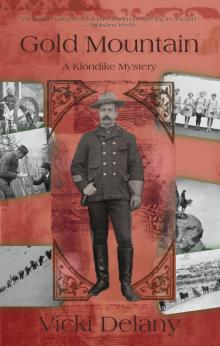 Gold Mountain
Gold Mountain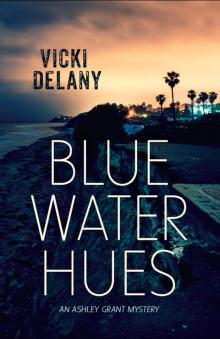 Blue Water Hues
Blue Water Hues Hark the Herald Angels Slay
Hark the Herald Angels Slay Murder at Lost Dog Lake
Murder at Lost Dog Lake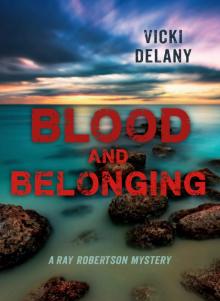 Blood and Belonging
Blood and Belonging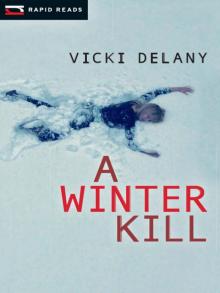 A Winter Kill
A Winter Kill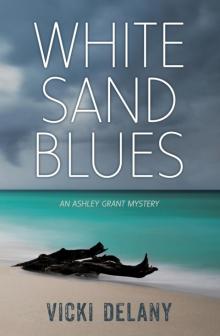 White Sand Blues
White Sand Blues Scare the Light Away
Scare the Light Away Burden of Memory
Burden of Memory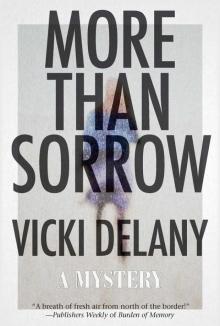 More Than Sorrow
More Than Sorrow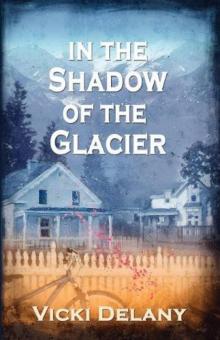 In the Shadow of the Glacier
In the Shadow of the Glacier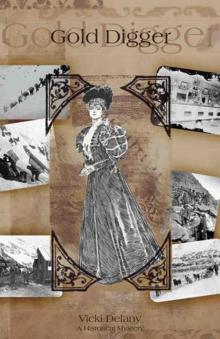 Gold Digger: A Klondike Mystery
Gold Digger: A Klondike Mystery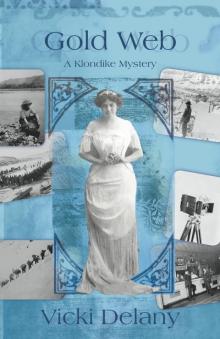 Gold Web
Gold Web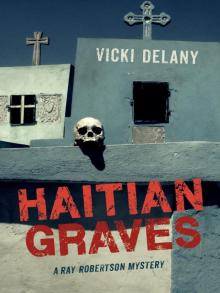 Haitian Graves
Haitian Graves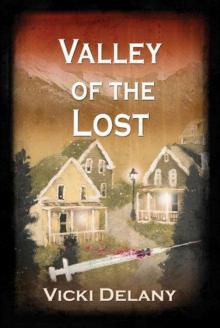 Valley of the Lost
Valley of the Lost We Wish You a Murderous Christmas
We Wish You a Murderous Christmas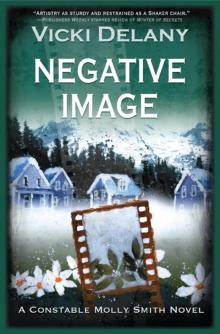 Negative Image
Negative Image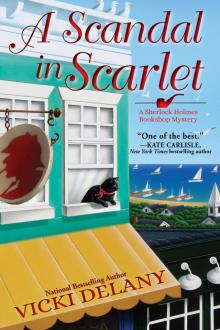 A Scandal in Scarlet
A Scandal in Scarlet Juba Good
Juba Good Winter of Secrets
Winter of Secrets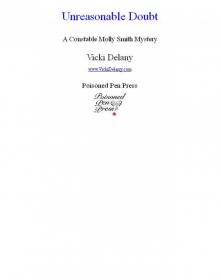 Unreasonable Doubt
Unreasonable Doubt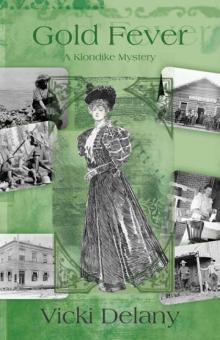 Gold Fever
Gold Fever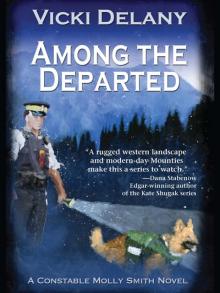 Among the Departed
Among the Departed Elementary, She Read: A Sherlock Holmes Bookshop Mystery
Elementary, She Read: A Sherlock Holmes Bookshop Mystery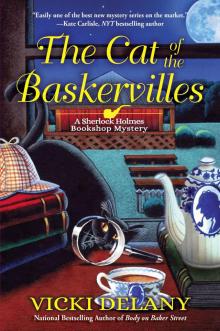 The Cat of the Baskervilles
The Cat of the Baskervilles